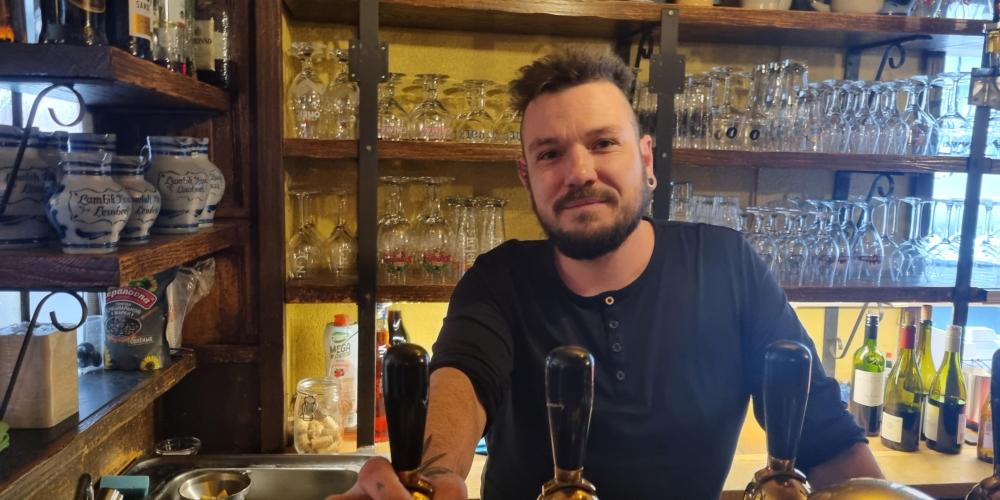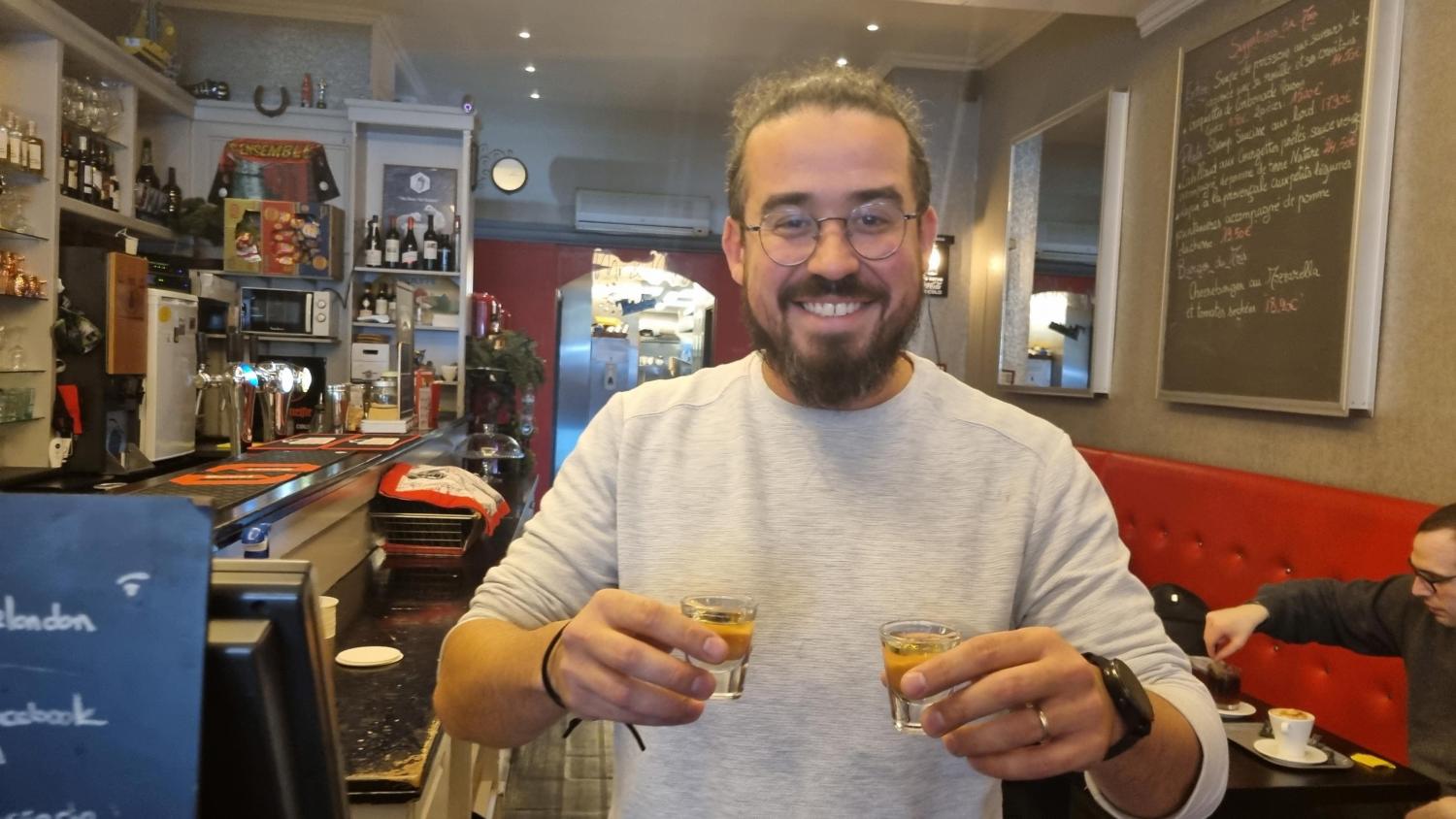
Earning cash in the drinks trade after your degree: two VUB alumni are happy to be watching Brussels‘ diverse life from behind the bar. “Brussels is a brilliant city, and a world apart in Belgium,” they say.
“In my third bachelor year, I started working at a restaurant chain. Clearing tables and serving, that kind of thing. It was actually a rubbish job, but the contact with people made up for everything. That’s what you do it for, that social aspect.”
Benj Van de Pol looks back on student life at VUB with a smile. “I was initiated. I see student association life as a game and I don’t recognise the horror stories – of course, bad behaviour needs to be addressed. But I made friends I would never have met otherwise. Law students were totally different types from us philosophers. Through the associations, you got to talk to each other. I got to know and appreciate people whose opinions were different from mine. Surely that’s a very valuable life lesson.”
After studying philosophy at VUB, Benj travelled the world – Scotland, Australia, New Zealand, India, Nepal, eastern Europe – before finding work in Brussels a year ago at the estaminet In ‘t Spinnekopke. “I was born in Grimbergen, but I never felt at home in Belgium. I moved abroad, where I could make a living anywhere in the catering industry,” he says. “You work very hard and people sometimes shout at you. But people in the catering industry have enormous solidarity and when the shift is over, it’s over. You don’t take the work home with you.”
He works at In ’t Spinnekopke as maître d’. “I do as much as I can to make the owners’ lives easier: take orders, make sure service runs smoothly, manage the waiters, regularly work behind the bar.” In ’t Spinnekopke has been in the hands of new owners for a year. The restaurant on the Bloemenhofplein aims to offer traditional, local and honest cuisine to Brussels residents, and to boost the neighbourhood. “We want to be a place where people from the neighbourhood come together,” he says.
“Brussels is a brilliant city, and a world apart in Belgium. There is a completely different mentality here. Thanks to its diversity and multiculturalism, Brussels is very open-minded. Tourists also feel that warmth. Of course, as in all big cities, there are drawbacks, but they outweigh the positives. Many people who move here adopt the Brussels identity. Whether they come from West Flanders, from Antwerp or Bruges: they call themselves Dutch-speaking Brusselaars, not Flemish Brusselaars.
“The bosses are my friends. That’s how it goes in the hospitality business. Our professional and social lives intertwine. A psychologist might shake his head at that, but in their spare time, hospitality workers hang out together a lot. With colleagues from other bars, we regularly meet up after shifts at one of the Dutch-speaking cafes in Brussels: Brasserie Afflichem[ST1] , Les Brasseurs, Merlo, Le Coq...”
Another world: Place du Luxembourg
Less than two and a half kilometres as the crow flies from the Bloemenhof neighbourhood, you’re in another world: Place Luxembourg in EU quarter. This is the home of politicians, advisers, interns, lobbyists and everyone else on the European circuit. In the cafes around the square they gather to have lunch, drink, talk business.
The London Tavern is one such cafe. It’s run by Kemal Eryürük, a former business engineering student at VUB. He was born in the Brussels commune of Sint-Joost and now lives in the trendy part of Schaarbeek. “I don’t have that many Brussels customers in the London Tavern. I do have European ones. They differ from country to country. Spaniards always try to squeeze the last drop out of everything, Poles are very friendly and never give problems.” And Dutch people? “We don’t see them here very often.”

Kemal Eryürük took over the café in Luxembourg Square from his mother.
Kemal took over his mother’s business when she became very ill. “I was already working here every weekend and really enjoyed it. From the moment you have your own business, it’s difficult to work for someone else. I can’t get up at seven o’clock for a boss anymore.”
On Thursday nights, his cafe and Place Luxembourg are packed. All the seats on the terraces are occupied and the eurocrats – they hate that name – drink their pints en masse standing on the square’s lawn. “With Covid, things have changed. It used to be colleagues of the EU Commissioners and now they’re mostly trainees. But they pull out all the stops for them: there are beer taps outside and DJs play plenty of music.” Why on Thursdays? “That’s when EU staff actually end the week. On Friday, the European quarter in Brussels empties out. Many officials leave for their home countries then. At weekends, many of the pubs also close. But we don’t.”
On the menu on the wall of the London Tavern, the classic Belgian stoemp tops the list. “That is indeed a bestseller. The international crowd loves to eat it. Also popular are the Belgian beers. But we change the menu regularly. A number of people come to eat here every day, so you have to be able to offer them new dishes. The lunches are very popular.” What’s also catching on is the new room upstairs. “EU officials use that as a space for meetings. That was a good move.”
This success is also necessary, as the hospitality industry has been going through tough times. “We have to make up for heavy financial losses: first there were the terrorist attacks in Brussels, then we were swamped by Covid and then we had huge energy bills due to the war in Ukraine. We have to recoup all that.”
Kemal is honest: “In the hospitality industry, it’s hard work and everything has become more expensive. But the work itself and the contact with people is very satisfying. And I’m proud of my cafe. Besides, my mother is better. That’s the most important thing.” He invites VUB students and alumni to pop in to taste the homemade shots. “Caramel and coconut. Delicious!”